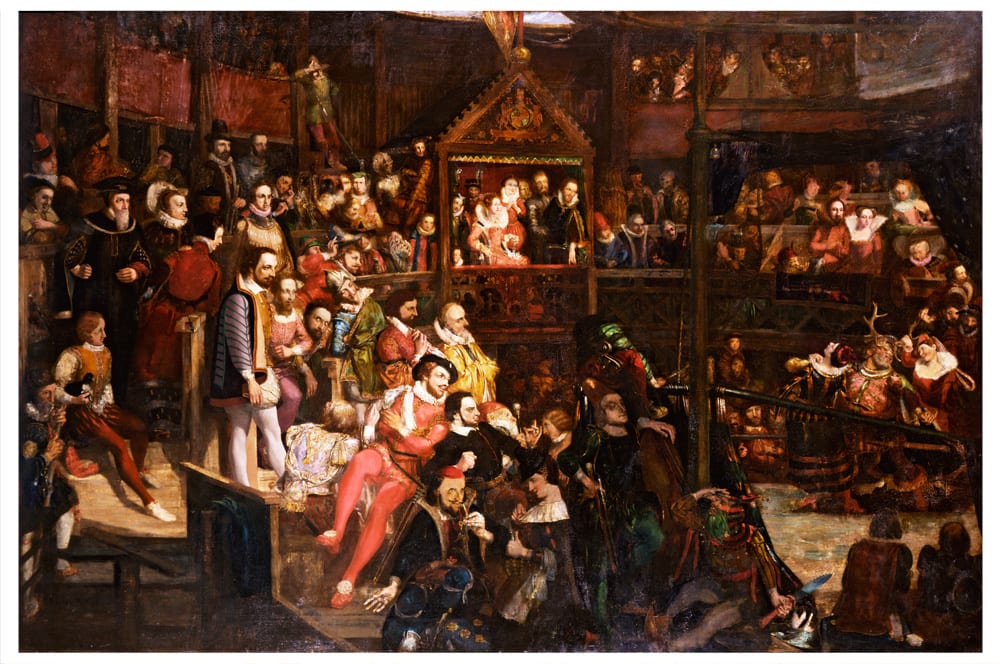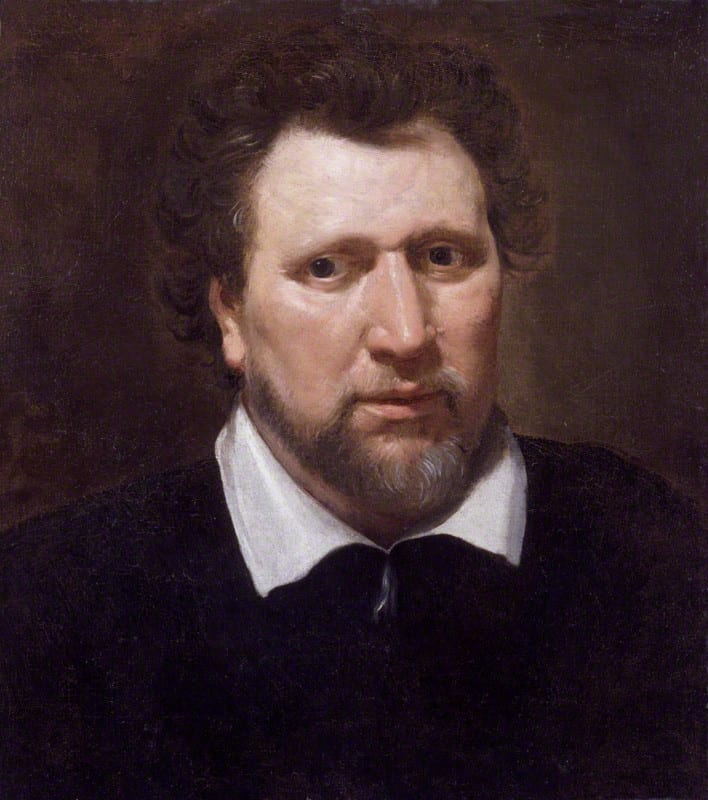Introduction to The Renaissance [Britain]
While Britain wasn’t the first to be influenced by the Renaissance they certainly didn’t remain out of the loop for long. The Renaissance didn’t thrive in Britain until 1485. In 1485 the accession Henry VIII took place, creating political stability that allowed the Renaissance to flourish. In Britain the Renaissance took on a more education/literature foundation unlike other countries such as Italy that focused more on the artistic aspect. While there were many branches and genres of literature throughout the renaissance, one of the most influential was that of the Elizabethan theater. A common concept within theater works was the idea of humanism. Thomas More’s work Utopia is a more popular example of humanism within text. From the focus of humanism on to the focus of eternal fame in Shakespeare to that of blank verse with Marlowe, there is much to learn through the Evolution of Renaissance in the Elizabethan Theater.
 |
| Elizabethan Theatre – Victoria and Albert Museum |
Timeline
- 1485 – Accession of Henry VIII
- 1516 – More’s Utopia
- 1517 – Reformation
- 1552-1599 – Edmund Spenser
- 1564-1593 Marlowe ( influence of blank verse pg 1107)
- 1564-1616 – Shakespeare ( no other writer of his time could write in his style of so many characters)
- 1564-1585 – Lord Chamberlain’s Men
- 1572-1637 – Ben Jonson
- 1572-1588 – Earl of Leicester’s Men
- 1576 – Building of ” The Theatre” ( the first permanent theater for performances- Blackfriar)
- 1584- Blackfriars closes
- 1588 – Marlowe’s Doctor Faustus
- 1590 – Spenser’s Faerie Queen (1-3)
- 1594 – Shakespeare’s Taming of the Shrew
- 1596 – Spenser’s Faerie Queen (4-6)
- 1597 – The Globe Theatre is built
- 1599- Performances at “The Globe”
- 1605 – Jonson’s Volpone
- 1610- Blackfriars reopens
 |
| Henry Howard, The Earl of Surrey |
 |
| Edmund Spenser |
Acting Troupes
- he Earl of Leicester’s Men were the earliest organized Elizabethan acting company. In 1576, a member of the troupe built The Theatre. In 1588, when the Earl of Leicester died, the troupe merged with Lord Strange’s Men.
- Before merging with the Earl of Leicester’s Men, Lord Strange’s Men toured provinces. From 1588 to 1594 they performed at The Theatre and The Rose Theatre, where they have been said to have performed some of Shakespeare’s plays.
- From 1576 to 1579, The Admiral’s Men were considered to be the finest Elizabethan acting troupe. They disbanded when the Chamberlain’s Men began to gain popularity.
- Chamberlain’s Men were known as the “Hunsdon’s Men” until 1585 and were the most important acting company. The Chamberlain’s Men had exclusive rights to Shakespeare’s plays.
Playwrights of Elizabethan Threatre
 |
| Adapted From: https://sites.udel.edu/britlitwiki/files//2018/06/cfd005220d67394970ee573ce1069d9f.png |
William Shakespeare (1564-1616)
-
Home Life
Due to a lack of concrete evidence, most biographical information is well formulated scholarly congecture. Most historical evidence points to William Shakespeare being born April 23, 1564 in Statford-upon-Avon. His father, a well to do leather merchant, and his mother, a local heiress sent young Shakespeare to Stratford’s New Grammar School where he received a classical education. At the young age of 18 Shakespeare married his wife, Anne Hathaway.They lived happily, having a total of three children, Susanna the oldest and the twins Judith and Hamnet. Shakespeare most likely spend the vast majority of his time apart from his wife and family working as an actor in and around London. While rising to his eminence in the theater scene, Shakespeare supplemented his income with several realestate ventures including The Globe theater. Shakespeare lived exactly 52 years, dying on his birthday in 1616.
Professional Career
Shakespeare stared producing plays in ernest in the early 1590’s. His early works were primarily histories the likes of Henry the IV and Richard II. Shakespeare also composes many of his Comidies during this period. His plays were well reieved upon their release, often gathering large chest nut chomping crowds. Early in his career, Shakespeare moonlighted as an actor. Forgoing his role on stage as he aged, Shakespeare progressed to write tragedies and to pioneer a new subgenre of play, the tragic comedy. Writting a at least 37 plays and 57 sonnets, Shakespeare’s legacy endures through the ages(1)(2).
Christopher Marlowe (1564-1593)
- Christopher Marlowe was baptized February 26, 1564 around the town of Canterbury. He studied at the King’s School and proceded to attend Corpus Christi College on scholarship. It is while he was attending this institute that he wrote Dido, Queen of Carthage. After his schooling, Marlowe proceeded to write his next great work, Tamburline. After the success of Tamburline, Marlowe wrote his plays: The Tragic History of the Life and Death of Dr. Faustus, The Jew of Malta, Edward II, and The Massacre at Paris. While many scholars believe that Marlowe was exclusively a playwright , there is a small body of evidence which suggests that the young Christoper Marlowe was a secret agent for the throne. Later in his breif life, Marlow becomes mired in controversy surrounding his appearent atheism. Luckily, as opposed to being hung, Marlow is placed in a form of probation until he dies young at the age of 29. Most reports of Marlowe’s death say that he was stabbed in the forehead over a disagreement regarding a tab at a bar; however, conspiracy theorits believe that Marlowe’s murder had a more dubious cause relating to his alleged service (3).
Ben Jonson (1572-1637)
- Born in London, Jonson was the son of a clergyman and stepson of a master bricklayer. He was educated in Westminster School, where he learned to write prose. He spent a brief time as a soldier in the Netherlands before returning to London to be a playwright. Jonson loved to read the classics and so they were his greatest inspirations and influence for his own work. As for his personality, many say he was very combative and would have ended up arrested on a couple of occasions if it had not been for his ties to the clergy. After James I was coronated in 1603, Jonson became a popular playwright amongst royalty and was often employed to write masques, or dramas involving nobility taking on supernatural or lead roles. Jonson was also a friend and rival critic to Shakespeare. He was bestowed the honor of poet laureate in 1616. Following his death in 1637, Johnson was buried at Westminster Abbey, where his grave reads “O Rare Ben Jonson.”
- Most popular works: Volpone, The Alchemist, The Silent Woman
 |
| William Shakespeare |
 |
| Christopher Marlowe |
 |
| Ben Jonson |
Format of Plays and Poets’ Influence
When reading texts by different authors from the Elizabethan Era it is clear that many of these poets were being influenced by the same events transpiring at the time, as well as being influenced by each others’ writing styles and forms. Henry Howard, The Earl of Surrey, and the oldest out of the five most popular poets of the period, paved the way for the rest of them.
Surrey formatted the English sonnet, which then became a favorite writing style for Shakespeare. A sonnet consists of three quatrains and a couplet, all in iambic pentameter, and rhyming abab cdcd efef gg. Surrey was also the first English poet to publish work in blank verse.
It is not surprising then, that when Christopher Marlowe began producing plays he was one of the first artists to use blank verse in a [[#|play]]. As the Renaissance period [[#|continued]], Humanism became more and more popular. We see More’s influence on Marlowe’s Doctor Faustus. All of the heroes in Marlowe’s writing crave power, and their downfall is ultimately caused by the pursuit of that power.
Around the same time that Marlowe was producing poems, Spenser was also showing similar concern with the rise of Feudalism. After reading some of Spenser’s work, the reader can tell that he is refuting the importance of achieving the highest rank of human civilization and stressing the necessity of the well-being of others’. “Faerie Queen is thus an epic celebration of Queen Elizabeth, the Protestant Faith, and the English nation” (776). Jonson expressed the same fears when publishing Vulpone. He was afraid London would become involved strictly with commerce and then be “populated by greedy fools and conniving rascals” (1443).
The poet who was perhaps influenced the most by other artists and the surrounding culture was Shakespeare. He commonly borrowed plots from stories he had heard or read previously while giving them his own spin. While his subject matter and writing style were not new to Elizabethan audiences, Shakespeare’s ability to develop so many characters without losing the audience’s attention had never been seen before.
“Humanists often argued against feudalism, seeing it as a society dominated by the rich and exploitative of everyone else. Further, they saw feudal society as irrational, and, in many ways, as paying only lip service to Christian ideals.” Source of this quotation? In general this section needs reorganizing and tightening
The Beginning of the Elizabethan Theatre
There were two kinds of theatres built indoor/private and outdoor/public:
Public theatres were built in 1576-1642 and were [[#|open]] to everyone. They were outdoors and seated about 3000 people. There was General [[#|Admission]] then the Gallery seating (which cost more). The seating surrounded the three sides of the stage. The stage itself was raised and roofed and they would put a flag up to signal performance days. The three most known and crucial public theatres were The Globe, The Fortune and The Swan.
The private theatres were smaller and indoors. They were popular in the in the winter season, it would be too cold for the outdoor theatres. Their audience held up to about half of what the outdoor theatres could hold. The first private theatre opened in 1576 but closed eight years later, Blackfriars.reopened in 1596 and in 1610 and after was used for winter performances. Private theatres were popular in 1610-1642. There was about six theatres by 1642, located in London. After the rising popularity of indoor theatres outdoor theatres went to only performing in the five warm months of the year.
No citations here

An outdoor/public theatre performance.
Works Cited
http://anewscafe.com/2012/07/11/looking-for-summer-fun-head-to-ashland-for-an-outdoor-play/ (the picture of outdoor theatre)
http://people-and-persons.blogspot.com/2015/07/english-renaissance-theatre.html
Greenblatt, Stephen, gen. ed. The [[#|Norton]] Anthology of English Literature. 9th ed. Vol.
B. New York: Norton, 2012. [[#|Print]]
Trumbull, E. W. (2007, November 16). The elizabethan theatre. Northern Virgina Community College. Retrieved from
http://novaonline.nvcc.edu/eli/spd130et/elizab.htm.
(1) http://www.biography.com/people/william-shakespeare-9480323
(2) http://absoluteshakespeare.com/
(3) http://www.biography.com/people/christopher-marlowe-9399572#early-writing-career
